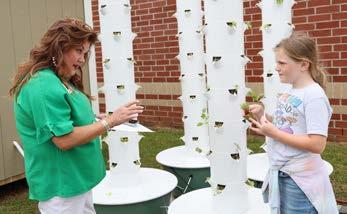
2 minute read
Mini Grants Bring Agriculture to the Classroom

By Maggie Edwards
As the school year wound down, dozens of students and teachers roamed the halls of Foley Elementary School (FES) proudly sporting shirts that read “STEAM.” FES gives a new meaning to the acronym which commonly stands for Science, Technology, Engineering, Art and Math — subbing out “art” with “agriculture.”
Teachers Shannon Keenan and Lisa Tidwell provide agriculture-filled lessons thanks to grants and teaching kits from Ag in the Classroom (AITC) and the Alabama Farmers Agriculture Foundation (AFAF). AITC Committee Chair Kim Earwood said it’s encouraging to see schools engaged with agriculture.
“We value educators who apply for and receive our AITC and AFAF mini grants,” Earwood said. “These grants are contributing to educators who teach
Raised-Bed Gardens
future farmers, agribusiness leaders, animal scientists, specialty crop farmers and more.”
The annual AITC Summer Institute allows educators like Keenan and Tidwell to gather ideas and learn how to implement agriculture into their curriculum. The FES STEAM teachers attended their first Summer Institute in 2021.
“What really started our ag journey was winning an egg incubator during that first conference,” Keenan said. “We currently have seven eggs in it now.”
She continued, “We went to Summer Institute our first year after finding out about it online. Now we go back as presenters to share with other educators.”
FES boasts an array of state-of-theart AITC projects. Lettuce towers, drones for checking produce and raised-bed gardens help students get their hands dirty as they learn about Alabama’s No. 1 industry.
“I believe children need to know where their food comes from,” Keenan said. “Baldwin County is rich in agriculture, but still, a lot of them don’t understand that our community is an agricultural community.”
Thanks to the AITC mini grant program, which awards grants each December, FES received a chicken coop, gardening material for the greenhouse and supplies for raised-bed gardens.
“We weren’t even doing agriculture before Summer Institute,” Tidwell said. “It planted the seed and gave us the opportunities to get these mini grants.”
Soil kits the teachers received during the 2022 Summer Institute help students dig into the possibilities of growing plants while at their desks.
But students find their most rewarding hands-on projects in the school courtyard as they drop their backpacks and put on a farmer’s mindset to test soil pH, fly drones or check lettuce towers.
The young leaders make a difference by donating produce to teachers for a locally grown lunch treat and supplying chickens to community members.
When asked why agriculture in the classroom was important, Tidwell’s answer was simple: Sustainability.
“We have to figure out how to sustain agriculture or we are going to be in trouble,” she said. “The kids don’t realize the connection of things they are doing to jobs that are actually out there and are available.”
Keenan and Tidwell have even recruited physical education teacher Amanda Daigle to their STEAM-focused studies.
“It is amazing combining PE and gardening,” Daigle said. “If anything in the garden needs to be done, my third graders and I will stop and go snip leaves, add soil or water plants.”
Daigle also runs the school garden club, which she started thanks to an AITC mini grant.
“Receiving an AITC mini grant fulfilled my dream of showing kids they can go from a tiny seed to something they can eat,” Daigle said. “Being able to bring them out and show them what one seed can produce is amazing.”
Earwood applauded FES’s work and commended similar programs across Alabama.
“My hope is for every educator in the state to involve themselves with projects like these so our children can see the world through an agricultural lens,” she said.
AITC mini grant applications open this fall and close Oct. 15 at alabamaaitc.org.







